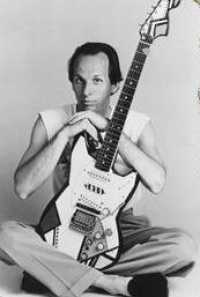For hardcore fret enthusiasts as well as avant-pop fans, it's hard to ignore Adrian Belew's eclectic interests. Example: whether you give two hoots or not about whatever midwestern demons supposedly afflict Trent Reznor, you're apt to become nervously curious about his having enlisted Belew on the everyman's industrial LP, The Downward Spiral. But while it becomes harder to take a bead on what album credits might bear his name (he recently produced a chart topping Christian pop ensemble for instance...), Belew solo works, like this first release on his new Caroline imprint label, remain a showcase for the breadth of his abilities.
Known as the vocal mouthpiece for the eighties and nineties versions of prog-art rockers King Crimson, and the angular electric guitar growler fueling the Talking Head's classic "The Great Curve," Belew has long maintained an association with off- kilter forms in music. His straight pop achievements are beyond notable, and as a sideman (Zappa, Bowie, Laurie Anderson) he's a stellar and compelling attraction. But now he's taken some of his more exploratory musings and set them against a broad compositional canvas, piecing together a vision of a massive, limitless guitar-scape.
Since his initial Island solo debut, Belew has interjected instrumental bits like the wonderful "Naive Guitar" (on 1982's Lone Rhino) onto his pop records. But when, after much labouring and personal turmoil, he delivered his last completely instrumental collection, Desire Caught By The Tail, he was dropped wholesale by his label. However, beyond The Guitar As Orchestra sharing the same sort of experimental kinship as Desire, it bears a different batch of characteristics. The ten new tracks have a more positive timbre to them: they are designed as light modern classical concert pieces, based on a notion of music akin to that found in film scores.
With the help of a hefty roster of gadgets, Adrian manages to effectively conjure a truly lush listening experience while stretching his audience's perceptions of himself as a composer. There's even a bit of digitally fashioned six string applause to open the album and set the tone of an orchestral performance.
From there forward, you're launched into territory that's got more than a fair amount of textures and moods. "Score With No Film" opens with a scurrying piano line that explodes via cymbal crash into a haunting, multi-layered blitz of string voices. The clutch of faux-violins establish a viable symphonic backdrop for the odd and disjointed keyboard improvs that begin to figure up front. At some points the disjointed tones resemble the artist doing his best to crank out the beautiful but somewhat random sounds from a mangled old music box. But the track is a good and proper herald for some of the other enigmatic rambles that Belew guides the listener along.
All of this follows, if nothing else, the logic of how the music was created, as Belew hammered out the oblique structures from recorded experiments collected over time. Leading with a brave heart, he then took to learning all the edits he had assembled for a particular track as one piece, committed it to tape, and finally added whatever orchestration he felt it required. Since none of this was ever scripted out (Adrian doesn't read music...), the task of navigating all the curious time signatures and other technical challenges by rote was an ultra-heady process.
But for all that bother, Belew has such a deft handle on the music that you may tend to forget that this highly evolved terrain was conceived and performed "solely" on guitar. The chimes that begin "Rings Around The Moon" are sparkling and honest and usher in the warm feel of evening. The piece progresses with the momentum of French horn and deep bass signatures and a freeform piano melody that leads the way.
The trouble with all this is that some of the more ambient moments on the disc have such a wispy structure that the passages can drop into the dim subconscious of the casual listener, something Belew wholly acknowledges in the liner notes where he says that the record "is best suited as a backdrop to common daily events." This may be just a wee bit overstated, particularly in light of a track like "Laurence Harvey's Despair" (dubbed as a nod to the obscure actor of the film "The Manchurian Candidate"), which nails the vague, downcast mood of the title.
While probably not the best intro to Adrian Belew either as craftsman or composer, The Guitar As Orchestra exists as an engaging aside to the eclectic hunches he sometimes follows. There's talk at the moment of his possibly performing these and other selections from the future Experimental Guitar outings already slated for release--perhaps even in the company of the Crimson King himself, Robert Fripp. Viewed up close and springing from their ridiculously nimble fingers, the material stands to potentially expose other masked and deeply woven charms.
